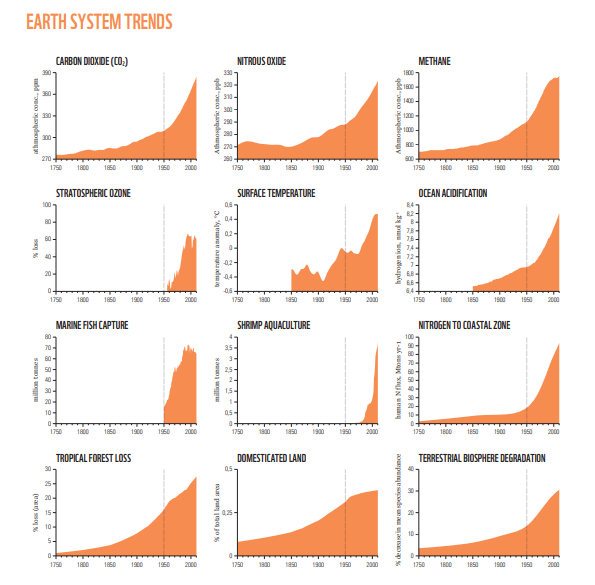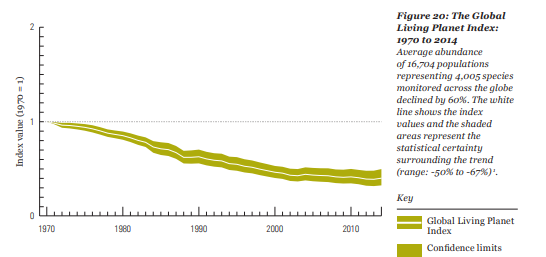Living Planet Index shows that within only 40 years, populations of vertebrates had decreased by 60%.
Living Planet Report led by World Wide Fund for Nature (WWF) since 1998 is yearly statement of global biodiversity level. That deep analysis shows shocking effects of rapid human expansion over the natural environment.
“Everything that has built modern human society is provided by nature and, increasingly, research demonstrates the natural world’s incalculable importance to our health, wealth, food and security.” — says Marco Lambertini; General Director of WWF International.
Our society is based on what the mother nature has given us. However, natural environment degradation and biodiversity drop are progressing too fast. Data from WWF report is though alarming.
Scientists name that phenomenon as “Great Acceleration” — constantly growing rate of changes in human’s activity since industrial revolution. It’s a huge exception in the history of our planet. For the first time during 4,5 billions years of Earth existence, those changes are so violent. Exploding human population causes enormous economic growth. Electric energy demand rises, pressure on agricultural land, production, water stress — they all consequently lead to ecological catastrophe.
All economic activity ultimately depends on services provided by nature, making it an immensely valuable component of a nation’s wealth. It’s estimated that, globally, nature provides services worth around US$125 trillion a year. Governments, business and the finance sector are starting to question how global environmental risks will affect the macroeconomic performance of countries, sectors and financial markets.
Degradation of ecosystems advances too fast for them to keep their biocapacity (ability to renew themselves). They do not cover resources demand anymore.
In March 2018, the Intergovernmental Platform on Biodiversity and Ecosystem Services (IPBES) released its latest Land Degradation and Restoration Assessment (LDRA), finding that only a quarter of land on Earth is substantively free of the impacts of human activities 178. By 2050 this fraction is projected to decline to just a tenth. Wetlands are the most impacted category, having lost 87% of their extent in the modern era.
The reason behind is improper management of resources and constantly driven consumption. Ecological footprint stands for a measure of natural resources use. Within past 50 years, it has risen by 190%.
Not long ago, Nature has published an information stating that from all species of plants, amphibians, reptiles, birds and mammals that had extinct from 1500 our age, 75% of them had been victims of resources overuse or agriculture or both factors.
Biodiversity is a guarantee of our life on Earth. Natural systems and biochemical cycles generated by the diversity allow functioning of our atmosphere, forests, oceans, landscapes and watercourses. They’re absolutely necessary and crucial for human existence and development.
If we are about to convert biodiversity drop trend, our voice has to be heard louder and wider. The extinction of a multitude of species on Earth seems not to have captured the imagination, or attention of the world’s leaders enough to catalyse the change necessary.
Despite numerous worldwide scientific research and political regulations that put priority on environmental protection, trends are still showing that biodiversity declines — says WWF.
“What is clear is that without a dramatic move beyond ‘business as usual’ the current severe decline of the natural systems that support modern societies will continue. Today, we still have a choice. We can be the founders of a global movement that changed our relationship with the planet, that saw us secure a future for all life on Earth, including our own. Or we can be the generation that had its chance and failed to act; that let Earth slip away. The choice is ours. Together we can make it happen for nature and for people.”



